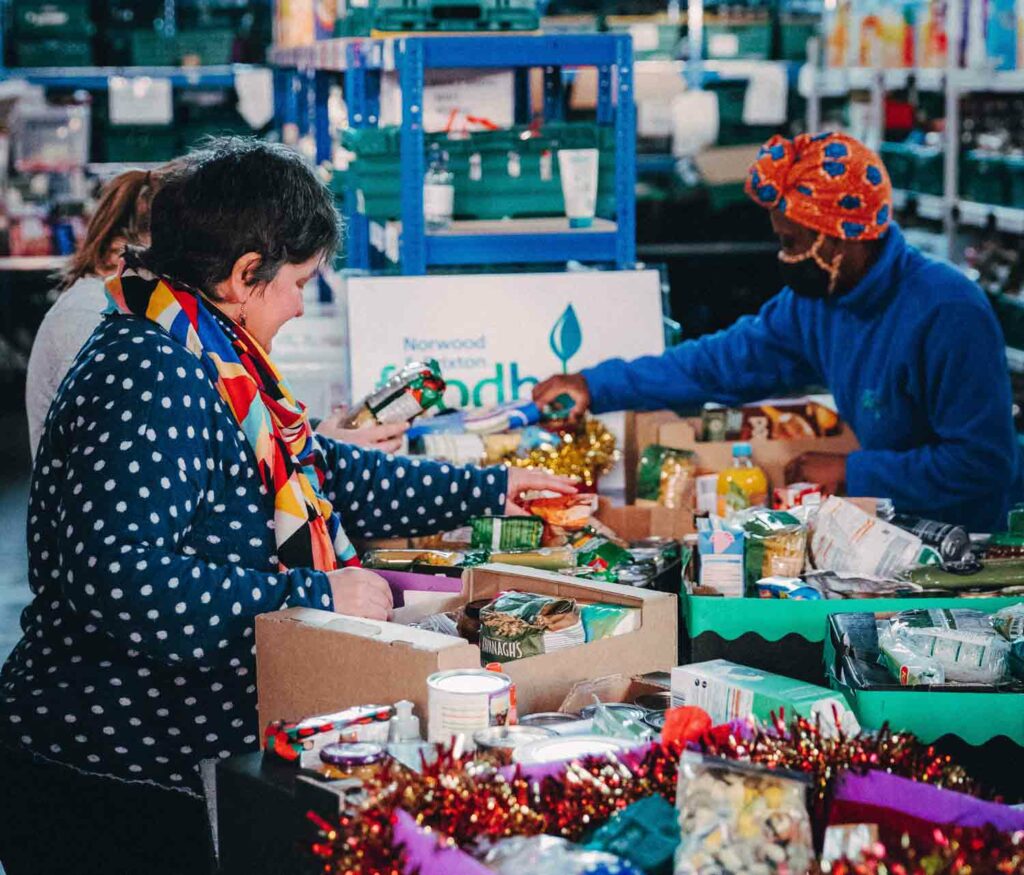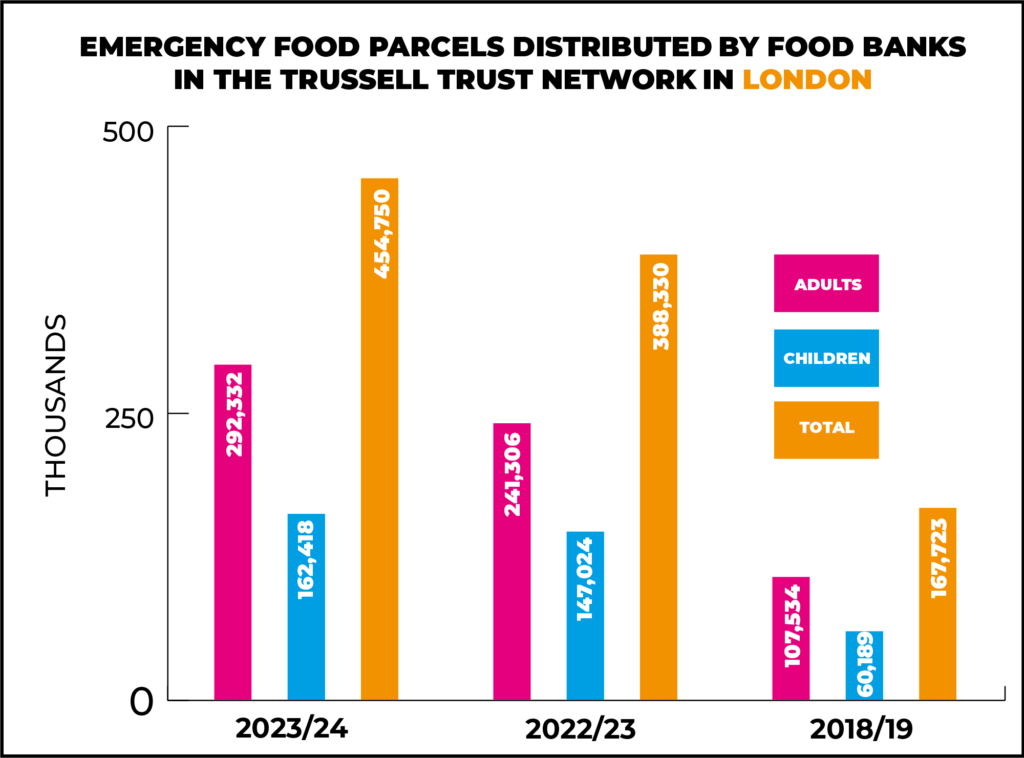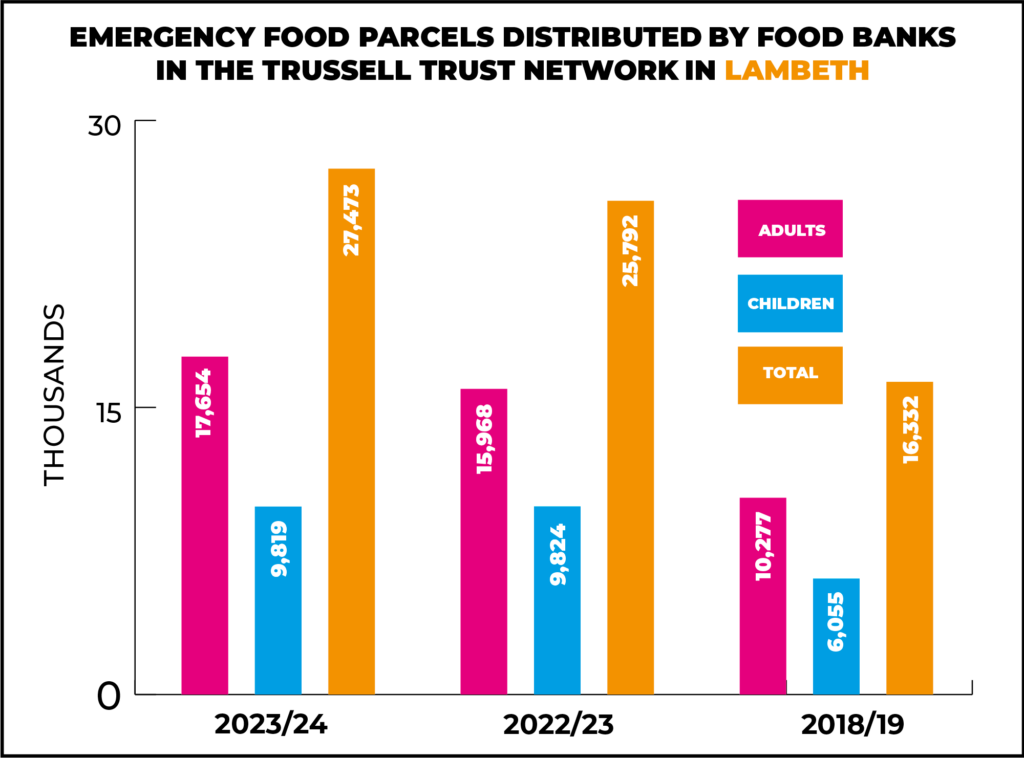
Food banks in the Trussell Trust network, which includes the Norwood and Brixton bank, distributed 454,000 food parcels in London over the past year, the latest figures reveal.
This is an increase of 171% compared to five years ago.
Lambeth is one of the top five London boroughs for the number of emergency food parcels distributed.
The charity today (15 May) calls for urgent reform of the social security system, so that “it ensures everyone’s income covers the cost of the essentials we all need in life”.
At the same time, it launched its own manifesto for the forthcoming general election.
The trust warned that the next UK government cannot afford to ignore this issue and urged political leaders to explain how they will build a future where no one needs a food bank to survive.
Figures released by the trust show that more than 454,000 emergency food parcels were provided in London to people facing hardship between April 2023 and March 2024.
More than 162,000 of these parcels were provided for children.
This is the highest number of parcels distributed in a single year by the food banks in the charity’s London network.
The trust said the number of people going without the essentials in London is higher than ever before.
This year’s figures represent a 17% increase compared to last year, when inflation was higher.
London has seen the highest increase of any region in the UK over the last year.
The charity warned that the picture is unlikely to change in 2024/25 unless “bold action” is taken.
Additional cost of living payments from government have come to an end, “leaving many people at a financial cliff edge,” it said.
Two thirds (66%) of all support provided by food banks in the Trussell Trust network in the capital last year was for families with children.

“Far too many people who previously didn’t need to turn to a food bank are now left with no other option,” the charity said. “Nearly 90,000 people living in London needed to turn to a food bank in the Trussell Trust network for the first time last year, a 82% increase from five years ago and the biggest increase across all the UK.”
The charity said that, while families with children and working-age adults are still over-represented at food banks, it has also seen an increase in parcels going to pension-age households, with more than 40,500 parcels provided for pension-age households in London, a 63% increase compared to last year.
“Rising poverty among pensioners, especially those still renting, means that more older people are finding themselves unable to afford essentials and facing hunger and severe hardship,” the charity said.
Shahid Mughal, interim head of food services at Southwark food bank, said: “We are consistently seeing unprecedented levels of need at Southwark food bank. Over the last 12 months, we’ve distributed 4,273 food parcels to local households who need our support, with 34% being families with children.
“Not being able to afford the essentials like food or heating has a huge impact on the wellbeing of people who need food banks.
“Many of the people we support are grappling with financial debt and the escalating cost of living, as well as dealing with physical or mental health conditions.
“With Universal Credit falling so far short, food banks like ours are under immense pressure and this cycle simply can’t continue.”
The Trussell Trust said it is calling for urgent reform of the social security system because “it is failing in its most basic duty – to protect people from going without essentials we all need in life”.
With many other organisations, the charity is urging the government to introduce an Essentials Guarantee to Universal Credit to ensure that everyone has a protected minimum amount of support so they can afford the essentials.

The trust also warned that plans to end the Household Support Fund in September will have “devastating consequences” for communities across England.
The fund has provided a vital lifeline, the charity said. Most local crisis support relied on it to fund both direct help for people struggling to afford unexpected costs, and preventive advice and support.
“If this disappears, councils and charities will be left scrambling to fill an enormous gap.
“More people are likely to fall into unaffordable debt, be unable to afford essentials, and have no choice but to turn to food banks – who are already at breaking point.”
Emma Revie, chief executive of the trust said: “It’s 2024 and we’re facing historically high levels of food bank need. “We must not let food banks become the new norm.
“Voters want to see a change and we need cross-government action at all levels to deliver it. We know what’s pushing people to food banks, so we know what needs to change.
“A supportive social security system is the bedrock on which we end hunger for good. Building on this, we need much more effective employment and financial support for parents, carers and disabled people and action to ensure everyone can have the security we all need to access opportunities and have hope for the future, through more secure and flexible jobs and investment in social housing.
“Food banks are not the answer. They will be there to support people as long as they are needed, but our political leaders must take bold action to build a future where everyone has enough money to afford the life’s essentials. The time to act is now.”
Figures from the Trussell Trust network do not reveal the full extent the scale of food bank use across the UK.
The Independent Food Aid Network (IFAN) has identified at least 1,172 independent food banks. There are also Salvation Army food banks as well as food banks run from schools and hospitals. There are also thousands of other food aid providers including soup kitchens and social supermarkets.
The Trussell Trust has set out in a manifesto what the next UK government must do to ensure that everyone has the security of being able to afford the essentials, and consign the need for food banks to history.






